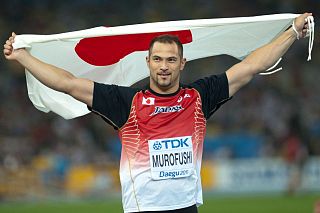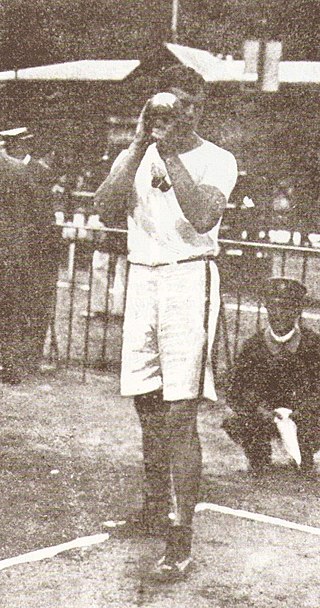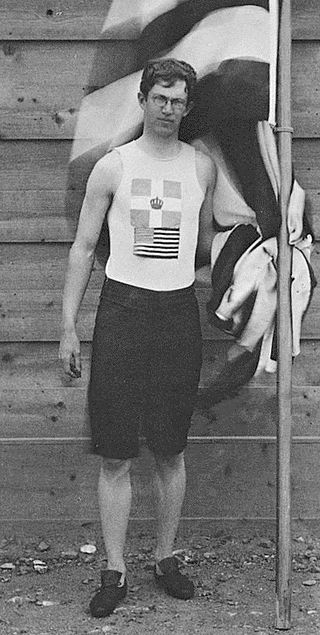
At the 1896 Summer Olympics, the first modern Olympiad, twelve athletics events were contested. A total of 25 medals were awarded. The medals were later denoted as 37 modern medals. All of the events except the marathon were held in the Panathinaiko Stadium, which was also the finish for the marathon. Events were held on 6 April, 7 April, 9 April, and 10 April 1896. Altogether, 63 athletes, all men, from nine nations competed. This made athletics the most international of the nine sports at the 1896 Games.

Adam McCright Nelson is an American shot putter and Olympic gold medalist. Nelson competed in three consecutive Olympic Games in 2000, 2004 and 2008. In addition to his gold medal at the 2004 Olympics, Nelson won a silver medal at the 2000 Olympics.

The men's hammer throw competition at the 2004 Summer Olympics in Athens was held at the Olympic Stadium on 20–22 August. There were 35 competitors from 24 nations. After a series of doping-related disqualifications, the event was won by Koji Murofushi of Japan, the nation's first medal in the event. All distances are given in metres.
Miltiadis Gouskos was a Greek athlete. He was born in Zakynthos and died in the British Indian Empire from food poisoning. He competed at the 1896 Summer Olympics in Athens in the shot put, placing second to Robert Garrett of the United States. Gouskos's best throw was 11.03 metres, short of Garrett's 11.22 metres.

Panagiotis Paraskevopoulos was a Greek athlete. He competed at the 1896 Summer Olympics in Athens, and the 1900 Summer Olympics held in Paris. He was born in Gortynia and died in Corfu.

Sotirios Versis was a Greek athlete and weightlifter. He competed at the 1896 Summer Olympics in Athens and the 1900 Summer Olympics held in Paris.

France competed at the 1896 Summer Olympics in Athens, Greece, from 6 to 15 April 1896. French athletes had appeared in every Summer Olympic Games of the modern era, alongside Australia, Great Britain, and Greece. France won the fourth-most gold medals with 5 and the fourth-most total medals with 11. Cycling was the sport in which the French competitors had the most success, as they completely dominated the field. The French team had 27 entries in 18 events, winning 11 medals.

Germany competed at the 1896 Summer Olympics in Athens, Greece. The Germans were the third most successful nation in terms of both gold medals and total medals (13). Gymnastics was the sport in which Germany excelled. The German team had 19 athletes. The Germans had 75 entries in 26 events, taking 13 medals.

Hungary competed at the 1896 Summer Olympics in Athens, Greece. Austrian and Hungarian results at early Olympic Games are generally kept separate despite the union of the two nations as Austria-Hungary at the time.

The men's shot put was a track & field athletics event at the 1900 Summer Olympics in Paris. It was held on July 14 and July 15, 1900. 11 shot putters from five nations competed. The event was won by Richard Sheldon of the United States, the nation's second consecutive victory in the men's shot put. Josiah McCracken took silver and Robert Garrett took bronze, completing an American medal sweep.

The men's discus throw was a track & field athletics event at the 1900 Summer Olympics in Paris. It was held on July 14 and July 15, 1900. 17 discus throwers from nine nations competed. The event was won by Rudolf Bauer of Hungary, the nation's first victory in the men's discus throw. František Janda-Suk gave Bohemia its first medal in the event, also in that nation's first appearance. Richard Sheldon's bronze put the United States in the top three for the second consecutive Games.

The men's long jump was one of four jumping events on the Athletics at the 1896 Summer Olympics programme. There were nine contestants in the long jump, held on 7 April. The American jumpers proved themselves dominant in taking the top three spots. The event was won by Ellery Harding Clark. Clark would later win the high jump as well, becoming the only man to win both the high jump and long jump in the Olympics.

The men's discus throw was one of two throwing events on the Athletics at the 1896 Summer Olympics programme. The discus throw was the fourth event held. It was contested on 6 April. 9 athletes competed, including one each from France, Sweden, the United States, and Great Britain as well as three Greeks and two Danes.

The men's shot put at the 2004 Summer Olympics in Athens was held on 18 August 2004 at the Ancient Olympia Stadium. It was originally planned to hold the discus throw at this venue, but it was discovered that the field was not large enough to accommodate the range of modern discus throwers, and would have posed a danger to spectators. As such, it was decided instead to hold the shot put at the site, despite the fact that the shot put was not contested at the Ancient Olympic Games. All distances are given in metres. Thirty-nine athletes from 26 nations competed.
The women's shot put at the 2004 Summer Olympics in Athens was held on 18 August 2004 at the Ancient Olympia Stadium. It was originally planned to hold the discus throw at this venue, but it was discovered that the field was not large enough to accommodate the range of modern discus throwers, and would have posed a danger to spectators. As such, it was decided instead to hold the shot put at the site, despite the fact that the shot put was not contested at the Ancient Olympic Games. There were 38 competitors from 28 nations. After a series of doping-related disqualifications, the event was won by Koji Murofushi of Japan, the nation's first medal in the event. All distances are given in metres.
The men's shot put event at the 1980 Summer Olympics in Moscow, Soviet Union had an entry list of 16 competitors from 11 nations. The maximum number of athletes per nation had been set at 3 since the 1930 Olympic Congress. The final was held on Wednesday 30 July 1980, with the qualifying round staged two days earlier in the Lenin Stadium. The top twelve and ties, and all those reaching 19.60 metres advanced to the final. The event was won by Vladimir Kiselyov of the Soviet Union, the nation's first victory in the men's shot put. The Soviet Union became only the third nation to reach the podium in consecutive Games in the event, as East Germany became the second to reach a three-Games streak on the podium as Udo Beyer took bronze. Beyer and Aleksandr Baryshnikov became the ninth and tenth men to win multiple medals in the shot put.
The men's shot put event at the 2000 Summer Olympics as part of the athletics program was held at the Olympic Stadium on Friday, 22 September. The shot put has been ever present since the beginning of the modern Olympic Games in 1896. Thirty-seven athletes from 27 nations competed. The maximum number of athletes per nation had been set at 3 since the 1930 Olympic Congress. The qualifying athletes progressed through to the final where the qualifying distances were scrapped and they started afresh with up to six throws. The event was won by Arsi Harju of Finland, the nation's first victory in the men's shot put since 1920 and first medal in the event since 1936. Americans Adam Nelson and John Godina took silver and bronze, respectively, with Godina becoming the 12th man to earn multiple shot put medals.

The men's shot put throwing event at the 1960 Olympic Games took place on August 31. Twenty-four athletes from 16 nations competed. The maximum number of athletes per nation had been set at 3 since the 1930 Olympic Congress. The event was won by Bill Nieder of the United States, the nation's fourth consecutive and 12th overall victory in the men's shot put. Parry O'Brien and Dallas Long took silver and bronze, giving the American team its sixth medal sweep in the event. O'Brien, who had won gold in 1952 and 1956, matched Ralph Rose in coming just shy of a third gold medal. The two remain, through the 2016 Games, the only men to win three shot put medals. Nieder was the fifth man to win two medals.

The men's hammer throw competition at the 2012 Summer Olympics in London, United Kingdom was held at the Olympic Stadium on 3–5 August. There were 41 competitors from 32 nations. The event was won by Krisztián Pars of Hungary, the nation's first victory in the men's hammer throw since 1996 and fifth overall. Primož Kozmus of Slovenia, the 2008 winner, took silver. Koji Murofushi of Japan, the 2004 winner, took bronze. Kozmus and Murofoshi were the 12th and 13th men to earn multiple medals in the hammer throw.

Combined events at the Summer Olympics have been contested in several formats at the multi-sport event. There are two combined track and field events in the current Olympic athletics programme: a men's decathlon and a women's heptathlon.
















